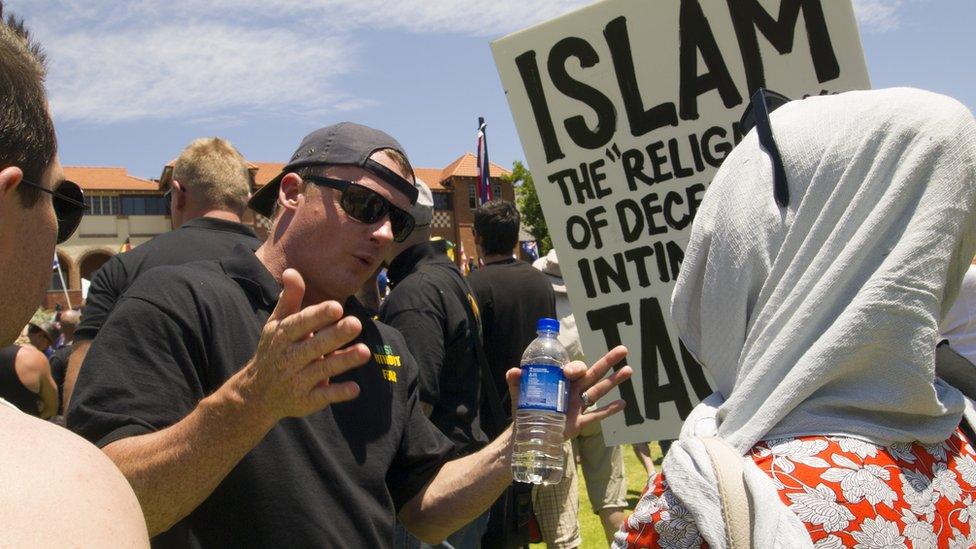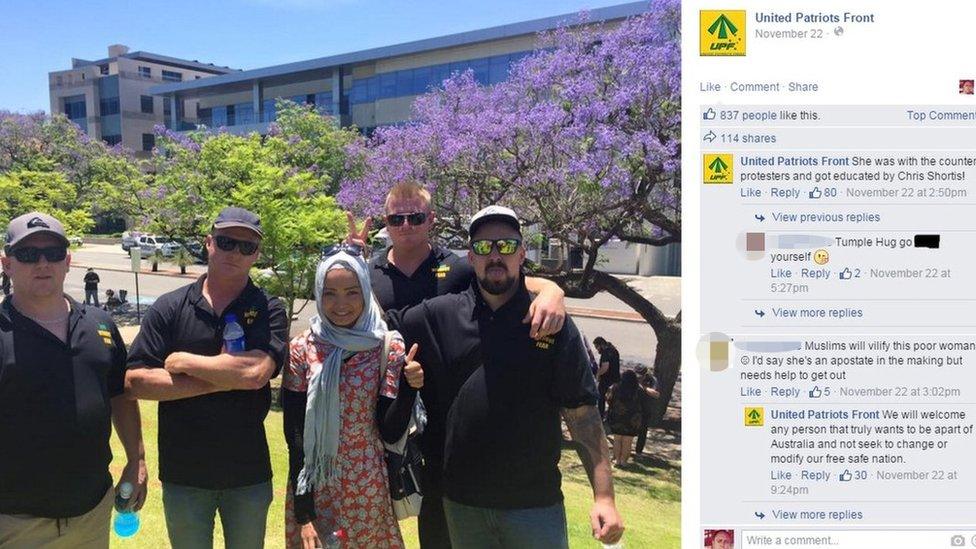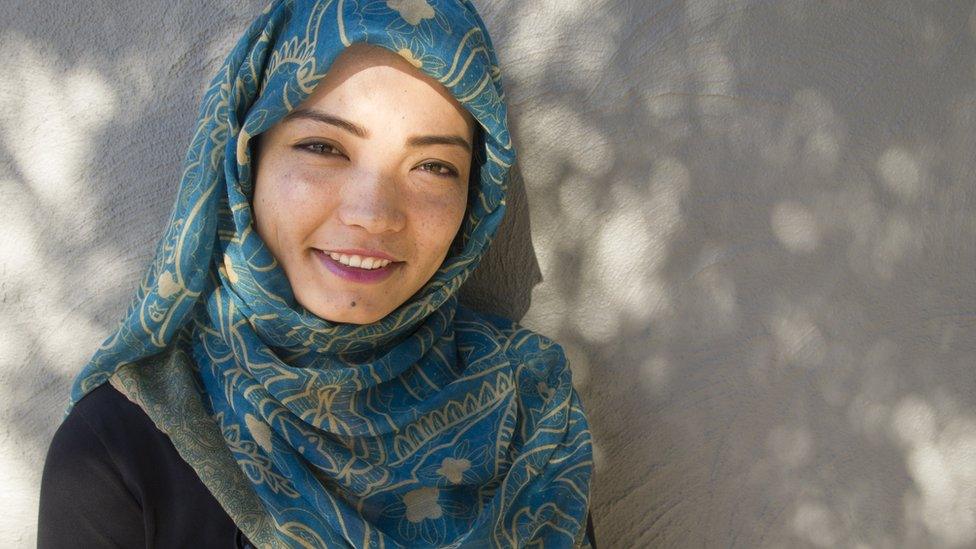Australian far right group ‘used me for propaganda’
- Published

Rahila Haidary speaks to the United Patriots Front's Chris Shortis
As a young girl Rahila Haidary defied the Afghan Taliban by dressing up as a boy to attend school. Now settled in Australia, this is the story of what happened when she confronted the far right United Patriots Front.
When anti-Islam movement Reclaim Australia held rallies across Australia on 22 November, Ms Haidary had planned to meet friends at the Perth counter-rally.
She never made it. Instead, she took a detour on the way over to find out what "the other side" had against her religion.
"I was just trying to make a point," she says. "As a Muslim I went there to tell people that not every Muslim is a strict Muslim. I'm not that person they think I am."
The Reclaim Australia protest movement is made up of loosely affiliated groups united by a deep suspicion of Islam and out of 200 people present on the day, those she ended up speaking to happened to be the core leadership of the United Patriots Front.
The United Patriots Front are a radical anti-Islam organisation from Melbourne whose leader, Blair Cottrell, wants Mein Kampf taught in schools. The group was standing at the back of the rally when they saw Haidary moving through the crowd and pulled her aside.
First they asked whether she would talk to them. Then they asked whether she would debate them. She agreed and for the next 15 minutes Ms Haidary listened as they took turns telling her how her religion was evil. She remained civil and polite.
When it was over, they asked to pose together for a photo. Ms Haidary hesitated and they asked if a male family member would be angry. She says she felt the need to prove she wasn't afraid, so she let them take it. One man held two fingers outstretched above her head, giving her "bunny ears".

A screen shot from the United Patriots Front Facebook page says they "educated" Rahila Haidary
She later said she left feeling overwhelmed: as the rally broke up a man verbally abused her; on the back way to her car, a woman asked Ms Haidary not to cut her head off.
An "education"
Later that night the UPF posted the photo to Facebook, telling their supporters they had "educated" Ms Haidary, "after she had come down from the counter protest".
She was horrified. From her perspective, the UPF saw her photo as a chance to soften its public image and communicate to supporters that their anti-Islam message had appeal.
One day later, UPF spokesman Chris Shortis posted a video describing the encounter. He claimed Ms Haidary conceded his superior knowledge of the Koran and might abandon her faith. Ms Haidary said she was just being polite and her faith was stronger than ever.
The BBC attempted several times to contact the UPF to clarify its interpretation of events, but the messages were not returned.
When Mr Shortis went on in the video to claim he and Abu Bakr Al-Baghdadi, the leader of Islamic state, would agree on their interpretation of Islam, Ms Haidary said she realised that in some ways Islamic extremists and Australia's most militant anti-Islamic group were exactly the same.
"They go straight on the Koran," she says. "If the terrorists read the Koran and interpret it in the wrong way, they become terrorists. That's also what these people are doing."
"I can't actually differentiate between them."
Defying the Taliban
And she should know. Well before she was engaging in debate with the UPF, Rahila Haidary was defying the Taliban as a six-year-old.
In 2001 the Taliban ruled her village in Uruzgan, Afghanistan. They had imposed a ban on girls attending school but Haidary couldn't see why boys got to have an education while she stayed at home. So she dressed as a boy and went anyway.
As soon as she walked in the door, everyone knew. All the boys in the class started to whisper and soon the teacher caught on. He threw her out and that same afternoon the local Taliban leadership met with her father to deliver a message - either his daughter left town, or she died.
Her father sent Haidary to live with family in Quetta, Pakistan. Five years later the Taliban forced out the rest of her family and they joined her. Soon after, her father disappeared into the mountains of Kandahar and was gone so long everyone thought he was dead.
It turned out he had made it to Australia by boat and on the day he called from Christmas Island Ms Haidary was the one who answered the call. All he could say was that the family was finally safe and in 2011, she came to Australia.

As a child, Rahila Haidary dressed as a boy to attend school in a Taliban-controlled area
"I have run away from terrorism. I am a victim of terrorism," she says. "That's why I am here."
Since coming to Australia, Ms Haidary has started university, found work as an interpreter and recently served as an ambassador for Unicef. For the most part she has made a new home in an adopted land, but her experience over the weekend has left her feeling disappointed and used.
"Religion is not terrorism," she says. "Religion is personal and the people who want to hurt people don't have religion."